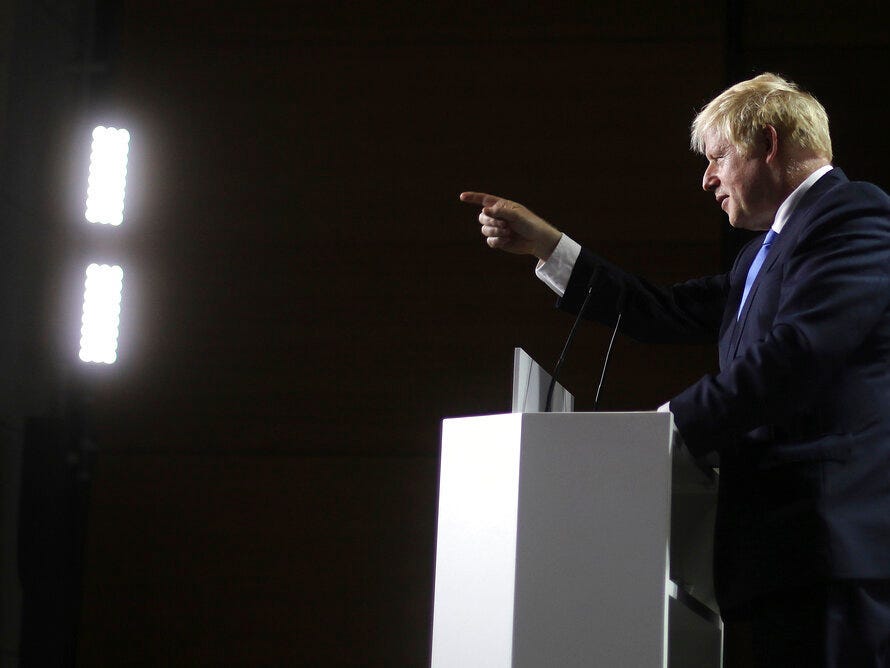- Conservative MPs could hold off moving against Johnson after the October party conference, sources believe.
- Discussions are underway about allowing another confidence vote, with the mood now "more tense than expected."
- But after rebels lost the last vote, they are waiting for the conference and the privileges committee report, sources say.
Conservative MPs say they are looking to move against Boris Johnson after October's party conference, with backbenchers "more tense than expected" following last week's dire by-election results.
The prime minister is under fresh pressure after losing Wakefield to Labour and Tiverton & Honiton to the Liberal Democrats — the latter being the largest Conservative majority overturned at a by-election.
One backbencher said colleagues were giving Johnson "time to fail" before moving against him in a more coordinated fashion, after rebels failed to oust him in a vote of no confidence earlier this month.
"He will be fine until after Conference," the MP added. "November will be the key period."
Autumn is likely to be critical with MPs expected to use the roving annual gathering, which this year takes place in Birmingham, as a "beauty parade" of leadership rivals. Meanwhile, the privileges committee is expected to report on whether Johnson misled Parliament — which, if found to be true, would usually be a resignation matter — shortly afterwards.
A prominent rebel added: "I don't think a rule change would be immediate — [we would] need a reason or an absolutely clear majority against the PM."
Another senior rebel told Insider that the party was still split over who would lead another leadership challenge.
"I think Cabinet knows it has to happen but lack the stomach or gumption and want to let the '22 do it," he added, referencing the 1922 committee of Conservative backbenchers.
At the weekend, former minister and chair of the One Nation caucus, Damian Green, called for ministers to move against Johnson.
Writing in The Sunday Telegraph, Green said: "It is not a secret that a significant proportion of the Cabinet think they could do a better job of leading the country than the incumbent. Now would be a good time to demonstrate those leadership qualities."
Johnson has since put a ministerial reshuffle — which was previously expected in July — onto the back burner, with The Times of London reporting on Monday that it has been rescheduled for autumn.
However, one MP said: "If there is no reshuffle in July, there won't be one as he will be too weak."
Another simply sent a carrot emoji — an allusion to comments previously reported by Insider that a reshuffle was a ruse to win over the "gullible."
Johnson's response to the by-election result has also prompted more criticism.
The prime minister shrugged off suggestions that it had weakened his grip on power, saying over the weekend that he was "actively thinking" about staying for three terms, taking him to the "mid-2030s."
Two sources, both Conservative MPs, also told Insider that Downing Street is looking to stack the executive of the 1922 committee — which can determine whether to change current rules and allow a further confidence vote before the 12-month grace period — by putting forward loyalists at the election next month.
However, Johnson critics, including Steve Baker, have already indicated they will stand for election. Insider is aware of at least one other rebel who is considering doing so — and the move to impose "stooges" may prompt more, sources said.
"No 10 briefing out that they will run a slate is a red rag," one Tory said.
Another said: "It's all very defensive. The govt purpose seems simply to shore up the PM — nothing else."
Sources say Sir Graham Brady, chairman of the 1922 committee, is not expected to be targeted by the prime minister's team after they unsuccessfully backed the Johnson loyalist Heather Wheeler to take the reins in last year's committee election.
On Friday, several Tory grandees publicly called for their colleagues to dump Johnson.
Former Conservative Party leader Michael Howard told the BBC: "I think the party, and even more importantly the country, would now be better off under new leadership."
He called for the 1922 committee to consider changing the rules so that a new leadership vote, despite Johnson having narrowly won during a recent challenge.
Cabinet ministers should also "very carefully consider their positions, as Oliver Dowden has done," Howard said. Dowden resigned as Conservative Party chairman early in the morning of the by-election results, saying "somebody must take responsibility."
Malcolm Rifkind, who served in Margaret Thatcher's final Cabinet, said Johnson could be brought down by a dozen junior ministers.
And Sir Geoffrey Clifton-Brown, treasurer of the 1922 committee, said the Conservative Party will hold "serious discussions" in the next few days "and then we will all have to make difficult decisions."
